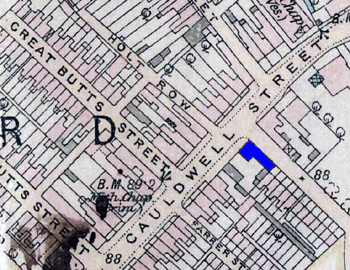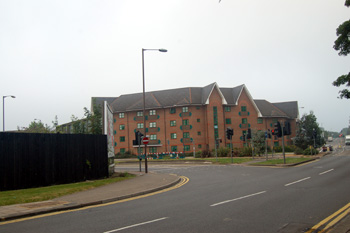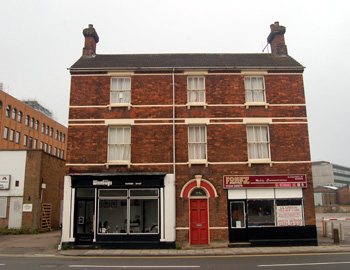The Haycock Beerhouse Bedford

The Haycock shown in blue on this map of 1901
The Haycock Beerhouse: 34 Cauldwell Street on the corner of Pilcroft Street, Bedford
The Haycock Beerhouse was built around 1835 on land which had once belonged to Cauldwell Priory. An abstract of title for the site [ref: WL550] records that in 1773 James Lucas, formerly of Tobago, and Mary his wife conveyed two closes of pasture in Bedford, Saint Mary, containing about nine acres called Pilcroft Closes to one Richard Smith alias Lion of Bedford, butcher, for £700. Smith made his will in 1775 and devised all his real estate to his wife Frances and instructed that, after her death, Pilcroft Closes should devise to his sons Richard, John and William equally. Richard Smith junior died in 1786 leaving his eventual third share of the closes (his mother was still alive) to his wife Sarah so long as she remained a widow. Sarah remarried in 1790 and her children by Richard - Richard, John, Sarah, Ann and Frances thus inherited the third share in the closes. Sarah's mother-in-law Frances died in 1798, aged 79. John Smith, son of Richard Smith alias Lion made his will in 1817 and devised his third share in the closes to his wife Catherine and, after her death, to their daughter Hannah. Richard Smith alias Lion's third son William made his will in 1823 devising his third share to his wife Frances and, after her death to their daughter Frances.
In 1830 the shares of Richard and John Smith in Pilcroft Closes were reunited when the various owners conveyed them to John Day of Bedford. In 1833 the share of William Smith was sold to Thomas Brandam of Bedford, carpenter by his daughter and her husband. It was part Brandam's purchase which, in 1833, was agreed to be sold to Bedford brewer Sir William Long. The site was described as measuring 62 feet along Cauldwell Street, 63 feet along west and east sides and 61 feet along the south side [ref: WL550]. The conveyance was carried out the next year and by 1836 [ref: GK76/2] the adjoining land was noted as abutting north-east on ground late of William Brandam, now the site of a messuage of Sir William Long called 'The Hay Cock'.
In 1855 the publican William Herbert was in trouble with the law. The Bedfordshire Times of 18th August reported that he had deficient measures for his beer and on 8th September that his weighing machine was faulty. A directory of 1854 describes Herbert as a coal and salt merchant of Gwyn Street - presumably the weighing machine was at the Gwyn Street premises and he ran the Haycock as a side line, a common occurrence in the 19th century. In 1863 a group of three militiamen, were drinking at the Haycock when they realised it was time they were back at their billets. They hurried up towards Saint Cuthbert's church and discovered the badly beaten Frederick William Budd and escorted him as far as Lurke Street. He died of his injuries the next day and the soldiers were called as witnesses at the trial of his killers.
In 1874 the Saint Paul's Brewery was sold by auction. This enterprise had been established by William Belsham in the late 18th century. He quickly leased it to Whittingstall and Long who were in occupation in 1784. The firm bought the brewery from Belsham in 1800 and in 1803 William Long bought out James Whittingstall. Long was knighted in 1814 and by 1830 was in partnership with William Pestell. On his death in 1841 his son Robert Newland continued the business as Newland and Pestell. After Pestell's death Newland continued the business alone and handed it over to his son Bingham Newland by 1861. Bingham died in 1873 and the business was auctioned the next year. The buyer was Thomas Jarvis who already owned the Phoenix Brewery in Midland Road and so he closed the Saint Pauls' brewery but continued to run the licensed premises including the Haycock. The sale particulars [ref: GA487] described the premises thus: BEER HOUSE called ‘The Hay Cock’ situate in Pilcroft Street, St. Mary’s Bedford, with yard, stabling for 10 horses, and other outbuildings, enclosed with folding gates, now in the occupation of John Wells Barker at a yearly rent of £20’. A report commissioned the following year noted that the Haycock comprised a bar, a shop, four bedrooms, a cellar, stables, cart shed and yard [ref: WL647]. Interestingly in a mortgage of 1874 the beerhouse was called the New Haycock, since called the Haycock, suggesting, perhaps, either that the original name was New Haycock (as there was another haycock somewhere in the area) or that it had, perhaps, been rebuilt at some time between 1835 and 1874.
In the licensed premises assessment book for Bedford of 1910-1911 [ref: Z720/214/2] the Haycock Beerhouse was described as being at 34 Cauldwell Street and tenanted by Frederick Lawson, who had been there for four months and paid £10 per annum rent. Trade was just a barrel of beer per week with "not a dozen" bottles of beer in the same period. The establishment had been valued at £28 for rates but that value now fell to £25 showing that the place was failing. This is not too surprising given that there were many competing houses in Cauldwell Street alone. Accommodation comprised: a cellar; a bar, in which beer was drawn from the wood; a jug room; a smoke room; a sitting room; a kitchen; four bedrooms on the first floor; two bedroom on the second floor and, outside, a stable for six horses, a coachhouse and a shed.
In 1915, after the death of both Robert Page Jarvis and Walter Jarvis, partners in the firm now called Jarvis & Company, Robert's executor conveyed his share in the business to Walter's widow and executor. Included in the conveyance was a dwellinghouse in Cauldwell Street, formerly called the Haycock which was then unoccupied [ref: DC/NB/E409/1]. Clearly the beerhouse had not long kept up the struggle after its valuation in 1910-1911. The Court of Chancery ordered that the premises should be sold by auction in 1916 the former Haycock being divided into two lots, the vacant former beerhouse itself and the outbuildings in connection with it and known as 34a Cauldwell Street, let to George Neal as a bootmaker's shop on a quarterly tenancy at £10 per annum rent. In July 1917 it was certified that the former Haycock and 34a Cauldwell Street had both been bought by John Blakeman of Saint John's Street, Bedford, dealer for £300 [ref: DC/NB/E409/1]. In the event, Blakeman proved to be a speculator and the next month sold on the property to James Caleb Summerfield of Wootton, brick and tile manufacturer for a £100 profit [ref: DC/NB/E409/2].
As it turned out Summerfield also turned a profit, selling the premises to another Blakeman, Harry Robert Macdonald Blakeman of Saint John's Street, Bedford, pig dealer in 1924 for £700 [ref: DC/NB/E409/3]. In 1952 Blakeman's trustees, his wife Edith Ann and daughter Catherine sold 34 Cauldwell Street to Bedford Borough Council for £2,000 [ref: DC/NB/E409/7]. It was demolished soon after -appearing in the Bedford Borough Directory for 1952 but not that for 1954. Pilcroft Street disappeared in road restructuring and widening between 1961 and 1963 being replaced by Kingsway.

The Haycock stood in the road in front of the houses on the corner. July 2008
Bedfordshire Archives has no photograph of The Haycock. However, given that it had three storeys it may have been similar to 20-22 Cauldwell Street which survive to the time of writing [2009].
List of Licensees: note that this is not a complete list; entries in italics refer to licensees where either beginning or end, or both, dates are not known:
1839-1841 William Herbert;
1861-1873: John Wells Barker;
1874 -1890: James Harrison;
1890: George Rushmer;
1890-1892: Aaron Ives;
1892-1893: Harry Ives;
1893-1899: Henry Fowkes;
1899-1903: Aaron Ives;
1910: George Neale;
1910-1911: Frederick Lawson

20-22 Cauldwell Street, July 2008
List of sources at Bedfordshire Archives:
- WL550: Abstract of Thomas Brandam to the site of the Haycock: 1773-1833;
- WL553: Site of the Haycock conveyed by Thomas Brandam to Sir William Long and Robert Newland: 1834;
- GK76/2: Abuttal in a deed in which it is described as formerly a piece of land now The Haycock: 1836;
- Bedfordshire Times: William Herbert prosecuted for deficient measures and a faulty weighing machine: 18 Aug to 8 Sep 1855;
- GA487: Sale of the St Pauls Brewery Estate: 1873;
- WL647: Described in a report to Thomas Jarvis by Spelman: 1874;
- PSBB5/1: Register of Licenses, 1890-1901
- Z720/214/2: Rate assessment book for licensed premises in Bedford: 1910-1911;
- DCNB/E409/1: Abstract of title of the trustees of Walter Jarvis to premises in Bedford and Kempston: 1917;
- DC/NB/E409/2: 34 and 34a Cauldwell Street conveyed by Mary Jarvis, Henry Young junior and John Blakeman to James Caleb Summerfield: 1917;
- DC/NB/E409/3: 34 and 34a Cauldwell Street conveyed by James Caleb Summerfield to Harry Robert Macdonald Blakeman: 1924;
- DC/NB/E409/7: 34 Cauldwell Street conveyed by Edith Ann and Catherine Blakeman to Bedford Borough: 1952